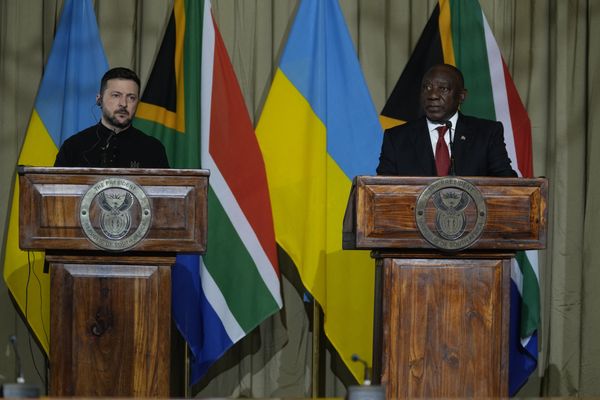
A primary school class
(Picture: PA Archive)The number of primary school pupils passing writing and maths SATs has dropped since the pandemic, new figures show, but reading levels have improved.
Department for Education figures show 59 per cent of 11 year olds met the expected standards in all three subjects this year, compared with 65 per cent before the pandemic.
Robin Walker, Minster of State for school standards said: “While this is disappointing, it was expected due to the impact of the pandemic.
“We welcome the increase in reading attainment from 73 per cent in 2019 to 74 per cent in 2022, despite the disruption of Covid, which is a tribute to the hard work and dedication of our teachers, pupils and parents.”
In a written statement he said: “Attainment in maths and in writing, however, are disappointing, but not unexpected: in 2022 71 per cent of pupils met the expected in maths, compared to 79 per cent in 2019, while in writing, 69 per cent of pupils met the expected standard, down from 78 per cent in 2019.”
Results for the grammar, punctuation and spelling test also dropped, as did those for science exams.
The results are the first since 2019 and highlight the stark impact of the pandemic on children’s learning.
The exams, which are often used to compare schools’ performance, were cancelled due to the coronavirus for the past two years. Headteachers argued it was unfair to hold the statutory exams this year amid ongoing Covid disruption. But despite the outcry pupils in Year 6 across the country took their SATs in May.
The government insisted it was important for assessments to go ahead to assess the impact of the pandemic, and said results will not be published in league tables.
Instead, the results will be shared securely with primary schools, academy trusts, local authorities and Ofsted for school improvement purposes and to help identify schools most in need of support.
A spokeswoman for the Department for Education said: “We recognise that pupils have missed a critical period of their education due to the pandemic and the Government is now driving forward work to get children back on track, including through our revolutionary National Tutoring Programme – with 1.5 million courses already delivered – and targeted support for whole areas of the country where standards are weakest.
“This work is being taken forward at pace and we know children are already making strong progress with their recovery.
“Unlike GCSE and A-Level exams, we did not adapt the KS2 assessments for pupils in 2022, and the expected standards in the assessments have remained the same as in 2019. This consistency means today’s data provides an important baseline from which to measure the impact of the pandemic and pupil’s progress over the coming years, as we work towards our ambitious target of 90% of children leaving primary school at the expected standards in reading, writing and maths by 2030.”
Geoff Barton, General Secretary of the Association of School and College Leaders, said: “It is hardly surprising the percentage of pupils meeting the expected standard in reading, writing and maths is lower than it was before the pandemic. It illustrates the very difficult circumstances affecting schools and pupils over the past two years, and it is to their immense credit that, within this overall statistic, reading attainment has actually increased despite the disruption of Covid.
“The fact that maths and writing are down is very likely to reflect the huge importance of direct classroom teaching in these subjects – which has, of course, been heavily disrupted.”
He added: “It is also clear that the pandemic has affected schools to widely varying extents and in this context we have urged the government not to use these results to compare schools. It has agreed not to publish performance league tables but it has nevertheless insisted upon supplying school-level results to Ofsted as part of the inspection process. We do not think it can possibly be fair to judge schools on this basis as it is a judgement that could be based more on the impact of the pandemic than it is on the performance of the school.”
Paul Whiteman, general secretary of school leaders’ union NAHT, said: “We need to be very careful with the conclusions we draw from SATs data this year. The disruption caused by Covid impacted children in many different ways, with some families and school communities hit far harder than others. This means that attempts to compare SATs results between schools is a pointless endeavour. It is impossible to discern the extent to which differences in results are reflective of changes to the quality of education provided by the school or simply indicative of the degree of disruption experienced.”
Kevin Courtney, Joint General Secretary of the National Education Union, said: "Students and teachers have worked incredibly hard this year, but it remains the case that SATs and other statutory tests do not support children’s learning. Our members tell us every year that a system that sets children up to pass or fail by the time they are 11 cannot be good for their mental health. They want children to develop a love of learning. Instead they report children who cry and display anxiety, while others become disengaged with their learning. They comment that preparing children for high-stakes tests lowers the quality of their education; in the months leading up to SATs, everything is focused on teaching to the test.”
It came as headteachers faced delays accessing the Sats results after the Primary Assessment Gateway website crashed.







